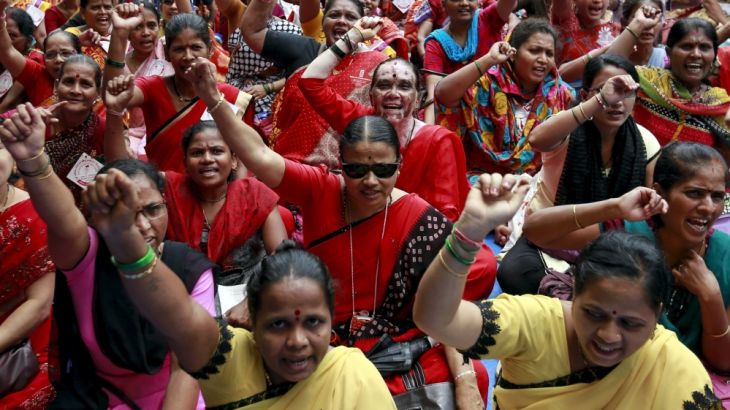Millions strike in India over government labour reforms
Trade unions say prime minister’s proposed changes will put jobs at risk and make it easier to lay-off workers.

Millions of workers across India have begun a 24-hour strike in protest against planned labour law reforms, the biggest show of strength by trade unions since Prime Minister Narendra Modi took office last year.
Unions say labour reforms planned by Modi’s government will put jobs at risk, and are demanding it scrap changes that would make it easier to lay off workers and shut down unproductive factories.
|
|
Gurudas Dasgupta, the secretaryof the All India Trade Union Congress, said the response by workers on Wednesday had been “magnificent” and estimated more than 150 million workers participated in the strike, although this could not be independently confirmed.
The strike, the biggest in India for more than two years, included staff at state-run banks and mines as well as some factory, construction and transport workers.
Most cities remained peaceful, but clashes between police and activists broke out in the eastern state of West Bengal, which has a long history of left-wing union activism, the AFP news agency reported.
Television footage showed police baton-charge protesters in the state capital Kolkata, and drag away women strikers who had staged a sit-in, while protesters threw stones and smashed vehicles.
Nearly 200 people were arrested across the state, the Press Trust of India news agency reported.
Banks, shops and other businesses remained closed in the city, stranding commuters and travellers at the main station, while dozens of flag-waving protesters halted suburban trains.
In Delhi, long queues formed at bus stops early on Wednesday, while passengers were stranded at airports as taxis and autorickshaws stayed off the streets.
Some protesters were reported to have forced autorickshaw and taxi drivers off the roads and vandalised their vehicles.
Foreign investment
Industry body ASSOCHAM estimated $3.7bn in economic losses from the strike, singling out the country’s ports where exports were stranded on the docks.
Modi has promised a string of business-friendly reforms to attract foreign investment and revive Asia’s third-largest economy.
His government wants to simplify India’s labour laws, which date back to the British colonial rule.
Businesses argue that conforming to India’s 44 national, and more than 150 state labour laws, is not only costly and time-consuming, but has also deterred foreign investors.